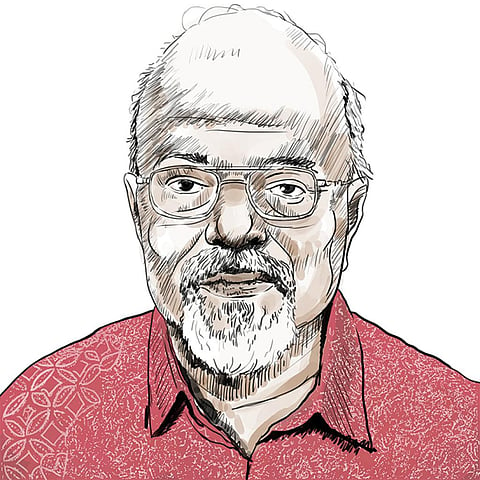In Memoriam: P V Satheesh was an agrarian revolutionary
A couple of decades ago, Pastapur village near Zaheerabad, Telangana, was the place for many of us looking for alternative models to alleviate India’s agricultural crises.
This is where P V Satheesh (1945-2023), the visionary leader he was, had nurtured Dalit women groups with little or no resources to establish models that were forerunners of many of the ideas discussed today, be it millet-based cropping systems, community-based seed or grain banks, direct marketing of agricultural produce, or reviving and using rainfed areas.
In 1983, Satheesh along with a few friends founded Deccan Development Society (DDS) in Hyderabad to empower farmers, especially women, through sustainable agriculture and community-led development. But his ideas inspired the entire nation.
DDS’ initiative to revive rainfed, degraded lands through women farmers working in their farmlands and adopting agrobiodiversity-based cropping systems to meet their food and livelihood influenced the country’s rural employment guarantee programme.
At a time when food security was focused on growing, procuring and distributing rice and wheat, DDS could establish an alternate public distribution system, called the Community Grain Fund, for locally grown millets.
It also began “biodiversity jatara (caravan)”, a month-long event in which bullock carts move across villages, displaying local biodiversity. Civil society, officials and communities flock to it every year. DDS has many accolades, like the Centre’s National Plant and Genome Saviour Award and UN Equator Prize.
Satheesh was involved in both national and international networks. As part of the Organic Farmers Association of India, he helped introduce the Participatory Guarantee System for organic certification and was a member of the Millet Network of India, South Against Genetic Engineering and the AP Coalition in Defense of Diversity.
He was India’s coordinator at the South Asian Network for Food Ecology and Culture, which represents over 200 ecological groups in five nations, and was associated with the Genetic Resources Action International, Spain, and the International Panel of Experts on Sustainable Food Systems, Belgium.
He launched Community Media Trust, which trains Dalit women in filmmaking, and facilitated India’s first rural, civil society-led community radio station, Sangham Radio.
My association with Satheesh began when we discovered illegal field trials of Bt cotton in Andhra Pradesh. I was working on issues around genetically modified crops then.
Through a series of discussions, we developed the idea of establishing an independent agricultural research centre, and the Centre for Sustainable Agriculture (CSA) was set up.
CSA draws from DDS’ work in adopting a scientific approach to agroecology, building community organisations and developing sound farm practices. Satheesh’s demise is a great loss, but his legacy will continue to inspire those who work for a more just and equitable society.
Ramanjaneyulu G V is executive director of the Centre for Sustainable Agriculture, Hyderabad
This was first published in the 1-15 April, 2023 print edition of Down To Earth


